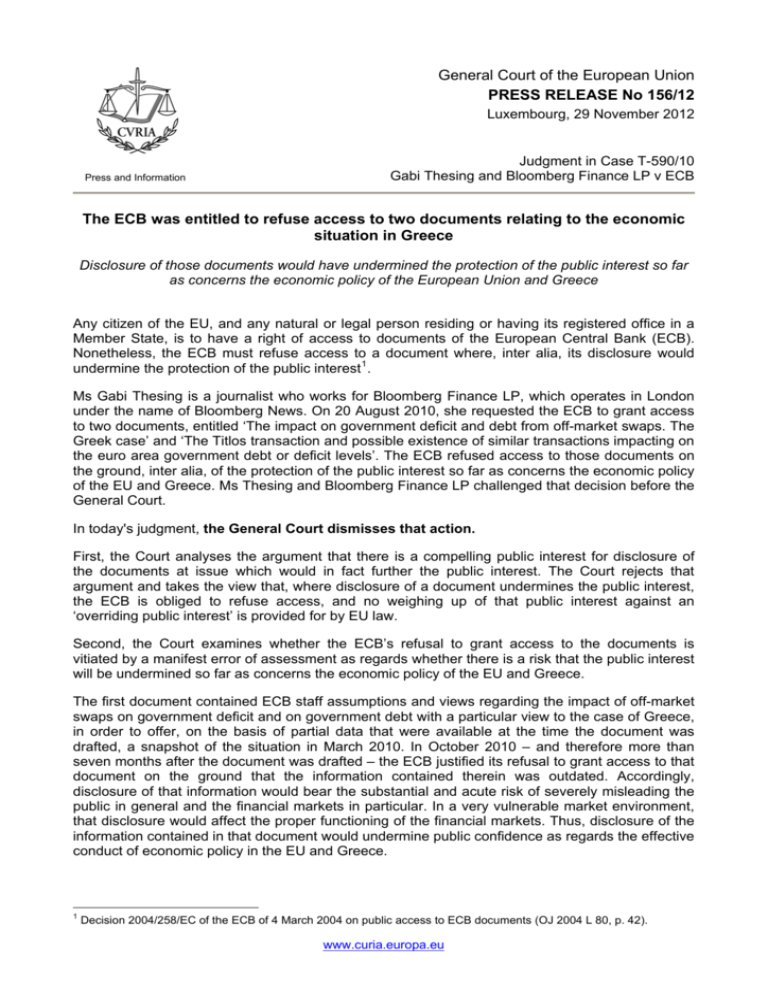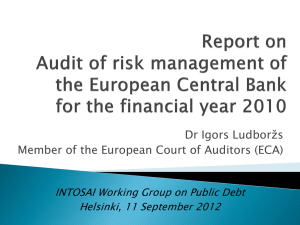Press and Information - curia
advertisement

General Court of the European Union PRESS RELEASE No 156/12 Luxembourg, 29 November 2012 Press and Information Judgment in Case T-590/10 Gabi Thesing and Bloomberg Finance LP v ECB The ECB was entitled to refuse access to two documents relating to the economic situation in Greece Disclosure of those documents would have undermined the protection of the public interest so far as concerns the economic policy of the European Union and Greece Any citizen of the EU, and any natural or legal person residing or having its registered office in a Member State, is to have a right of access to documents of the European Central Bank (ECB). Nonetheless, the ECB must refuse access to a document where, inter alia, its disclosure would undermine the protection of the public interest 1 . Ms Gabi Thesing is a journalist who works for Bloomberg Finance LP, which operates in London under the name of Bloomberg News. On 20 August 2010, she requested the ECB to grant access to two documents, entitled ‘The impact on government deficit and debt from off-market swaps. The Greek case’ and ‘The Titlos transaction and possible existence of similar transactions impacting on the euro area government debt or deficit levels’. The ECB refused access to those documents on the ground, inter alia, of the protection of the public interest so far as concerns the economic policy of the EU and Greece. Ms Thesing and Bloomberg Finance LP challenged that decision before the General Court. In today's judgment, the General Court dismisses that action. First, the Court analyses the argument that there is a compelling public interest for disclosure of the documents at issue which would in fact further the public interest. The Court rejects that argument and takes the view that, where disclosure of a document undermines the public interest, the ECB is obliged to refuse access, and no weighing up of that public interest against an ‘overriding public interest’ is provided for by EU law. Second, the Court examines whether the ECB’s refusal to grant access to the documents is vitiated by a manifest error of assessment as regards whether there is a risk that the public interest will be undermined so far as concerns the economic policy of the EU and Greece. The first document contained ECB staff assumptions and views regarding the impact of off-market swaps on government deficit and on government debt with a particular view to the case of Greece, in order to offer, on the basis of partial data that were available at the time the document was drafted, a snapshot of the situation in March 2010. In October 2010 – and therefore more than seven months after the document was drafted – the ECB justified its refusal to grant access to that document on the ground that the information contained therein was outdated. Accordingly, disclosure of that information would bear the substantial and acute risk of severely misleading the public in general and the financial markets in particular. In a very vulnerable market environment, that disclosure would affect the proper functioning of the financial markets. Thus, disclosure of the information contained in that document would undermine public confidence as regards the effective conduct of economic policy in the EU and Greece. 1 Decision 2004/258/EC of the ECB of 4 March 2004 on public access to ECB documents (OJ 2004 L 80, p. 42). www.curia.europa.eu In this respect, the Court observes that, at the time of adoption of the refusal decision, the European financial markets found themselves in a very vulnerable environment. The stability of those markets was fragile, in particular, because of the economic and financial situation of Greece. Moreover, that situation and the related sales of Greek financial assets were causing strong depreciations in the value of those assets, which also triggered losses for Greek and other European holders. In such an environment, it is clear that market participants use the information disclosed by central banks and that their analyses and decisions are considered a particularly important and reliable source to assess financial market developments. Consequently, the Court takes the view that the ECB did not commit a manifest error of assessment in considering that disclosure of that document would specifically and effectively undermine the public interest so far as concerns the economic policy of the EU and Greece. In support of that conclusion, the Court adds that the fact that the data contained were outdated does not permit the conclusion that, in the event of disclosure of the document at issue, financial market participants would also have regarded as outdated and therefore of no value ECB staff assumptions and views contained in that document. Although it is true that financial market participants are professionals who are accustomed to working with that type of document, the fact remains that they consider assumptions and views originating from the ECB to be particularly important and reliable for assessing the financial market. It cannot reasonably be precluded therefore that those assumptions and views would have been regarded as still valid. Accordingly, any clarification by the ECB on the disclosed version of that document, indicating that that information was no longer up to date, would not have been able to prevent its disclosure from misleading the public and financial market participants in particular on the situation regarding the government deficit and government debt as assessed by the ECB. Such an error might have had negative consequences on access, in particular for Greece, to the financial markets, and might therefore have affected the effective conduct of economic policy in Greece and the EU. The second document included, in essence, the background to the ‘Titlos’ 2 transaction as well as an analysis carried out by ECB staff on the financial structure of that transaction and the possible existence of similar transactions effected by other Member States. In this context, the ECB examined the manner in which Greece had used off-market swaps and the consequences of those swaps for existing risks. Since the content of that document is closely connected with that of the first document, the Court holds that, for the same reasons, the ECB’s assessment that its disclosure would undermine the economic policy of the EU and Greece is not vitiated by a manifest error. NOTE: An appeal, limited to points of law only, may be brought before the Court of Justice against the decision of the General Court within two months of notification of the decision. NOTE: An action for annulment seeks the annulment of acts of the institutions of the European Union that are contrary to European Union law. The Member States, the European institutions and individuals may, under certain conditions, bring an action for annulment before the Court of Justice or the General Court. If the action is well founded, the act is annulled. The institution concerned must fill any legal vacuum created by the annulment of the act. Unofficial document for media use, not binding on the General Court. The full text of the judgment is published on the CURIA website on the day of delivery Press contact: Christopher Fretwell (+352) 4303 3355 2 Titlos plc is a special purpose financial vehicle that was created on 26 February 2009 by the National Bank of Greece. Titlos plc issued a certain amount in euro of asset-backed securities due in September 2039. The underlying asset for the asset-backed securities named ‘Titlos’ was an interest rate swap between the National Bank of Greece and Greece. The ‘Titlos’ asset was required to be eligible as collateral for Eurosystem credit operations, and this was assessed by the central bank of another Member State after consultation with the ECB. www.curia.europa.eu







